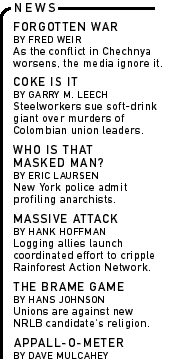|
|

|

|

|
|
|
| |
||
|
In the Trench Coats "Violent Reaction" (July 9) struck a familiar chord. I also remember the "disquieting sense of recognition" when I heard about the Columbine killings. Unlike Anthony Chase, I didn't wonder about the killer's sexuality. The trench coats were enough. I wore a trench coat through most of high school--and still do as a rain and winter coat. I have a fondness for black clothing. More to the point, I was an outsider throughout high school--just like killers in schools today. It's not that Chase is wrong. Surely homosexuals and even those simply accused of being homosexual are being persecuted as outsiders in high schools. It's just that they are not alone in that situation. Just ask the punks, goths, metalheads, freaks, poor, geeks or any members of the other traditional "non-popular" groups, especially those in suburbia, where the lawns aren't the only things that are expected to be manicured and identical. Steven Saus
Blood on All Hands I just read G. Pascal Zachary's story about Cambodia and was struck by Kassie Neou's statement that "we hoped the Americans would protect us, and they ran away" ("Sounds of Silence," July 9). I don't know anything about Neou, and maybe I'm misinterpreting this remark, but it seems to exemplify another aspect of Cambodia's reluctance to face the past. The fact is that the massive killings of civilians in Cambodia didn't start in 1975. There was a smaller scale but still horrendous level of killings performed by American B-52's "protecting" Cambodia, and also by Cambodians on both sides of the civil war. The Lon Nol government, and perhaps many of its supporters in Cambodia, was perfectly willing to win their war by totally destroying the Cambodian countryside with American bombs. As everyone surely knows, this policy helped recruit fanatical teen-age boys for the Khmer Rouge. A real attempt to grapple with the past would include an acknowledgment that, though the Khmer Rouge have the most blood on their hands, they are not the only Cambodian war criminals. Of course, as Christopher Hitchens has been pointing out, one of the biggest war criminals from that era is an American named Henry Kissinger. Donald Johnson
Sad Ignorance Salim Muwakkil's editorial piece reinforced yet another misperception of Latinos ("Changing of the Guard," July 23). Muwakkil begins by claiming that "the diversity of the Hispanic population makes coalition-building a tricky proposition." He follows by quoting Yvonne Scruggs-Leftwich, executive director of the Black Leadership Forum, as saying, "a large number of Hispanics are white" and that "the issues that resonate with people of color may not resonate throughout the Hispanic population." Although we are told in the Census, and elsewhere, that Latinos can be of any race, the fact remains that the great majority of people who identify as such are descendants of European, African and indigenous peoples. While some may be fair-skinned--they do have European ancestors, after all, and thus are as fair as some blacks with European ancestors--that certainly does not make them "white." What this quote (and its uncritical reinforcement) reveals is the sad ignorance that permeates American life when it comes to any knowledge about Latinos. If we are to harness the political power of a brown-black coalition, we must begin by first learning some very basic things about each other. Such deep and stubborn ignorance breeds this very fear of Latino political power and creates obstacles to coalition-building. We have a long way to go in creating political solidarity between blacks and browns. Perhaps we could start with some articles in In These Times about these people we call Latinos. José Orozco
Yes, More on Nader Kudos to both G. William Domhoff and Philip Johnson ("Letters," July 23). Progressives simply cannot afford to split forces between a major party and a nascent third party. As Domhoff points out, a primary fight within the Democratic Party would have been more effective in getting out Nader's message and would not have set the stage for the general election to be stolen by the Republicans. A lot of time, energy and money is wasted in keeping hundreds of organizations afloat to lobby legislators. Lobbying is a sign of political weakness unless the organization has the money and the votes to defeat recalcitrant office holders. So I agree that we need to run our own candidates. But we need to go further. By forming chapters called Democrats for Democracy, or whatever, we can go inside the Democratic Party and make it ours. There are plenty of grassroots Democrats who would join with us. I suggest that readers get a copy of the Democratic Party charter for their state and see how easy it would be for a group of determined activists to get elected to the state and national committees. We need to be the ones running the conventions and setting the agenda. Mary L. Wentworth
The July 23 "Letters" page contained several angry and cynical responses to Michael Moore's assertions that Democrats are using dishonest scare tactics to effectively vilify George W. Bush and simultaneously glorify the legacy of Bill Clinton. What Nader's campaign did, which they do not recognize or acknowledge, is inspire thousands of our nation's youth to become active in a system they otherwise would have spurned, and it brought to the table a number of issues that were flat-out ignored by Bush and Gore. In an age where the media scorn the youth of this country for their lack of interest in politics, that very same media ridiculed Nader's campaign for having such young followers. This hypocrisy is what we are up against. Unfortunately, Nader's campaign has worked to divide many citizens with similar beliefs. But I don't hold Nader responsible for this because he has done nothing but speak the truth and argue his side with the utmost respect for anyone who deserves it. Al Gore and Bill Clinton, I'm afraid, did not. Our work now, is to stop all the divisive bickering and come together to fight for what's right. We are losing a battle against the corporate world that wants to control the very laws that define us as a society. Nader, though, has planted the seeds of a larger movement to end this tyranny. I'll do my part. Eli Beckerman
Correction A credit line was inadvertently dropped from the photo of Terry Southern and William S. Burroughs that accompanied "Southern Exposure" by Chris Barsanti in the August 20 issue. The photograph should have been attributed to Jack Wright III.
|





